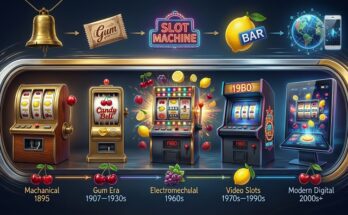Gambling has attracted people’s attention since ancient times with its unpredictability and the possibility of easy winnings. Behind the veil of chance is a solid mathematical foundation that helps to understand outcome probabilities and develop strategies to improve the odds of success.
Many online casino players don’t realize their options or the chances to win in gambling and hesitate to test strategies before playing with real money. However, there are plenty of ways to explore these opportunities, such as demo games or no-deposit bonuses like cash or free spins. Polish players can access the latter on the portal https://sizzlinghotspot.pl/darmowe-spiny/ for free, with no registration required.
In this article, we will explore how probability theory and mathematical models assist in analyzing gambling, as well as discuss whether strategies are effective in real-world conditions.
Basics of Probability Theory in Gambling
Probability is a mathematical concept that describes the chances of a certain event occurring. In gambling, probability indicates the likelihood of a player winning or losing depending on the rules and conditions of the game.
For example, in roulette, the probability of winning depends on the type of bet. A bet on a single number has a probability of 1 in 37 (in the European version), which is about 2.7%. When betting on red or black, the probability is closer to 50%, but not exactly 50% due to the presence of the green zero sector.
The Impact of Chance on Game Outcomes
In all gambling games online or live, chance plays a decisive role. Even in poker or blackjack, where a casino player can apply strategy, randomness still has a strong influence on the outcome. In roulette or slot machines, chance fully determines the result of each round.
Casinos online use random number generators (RNG) to guarantee the unpredictability of game outcomes. Although casino players can calculate the probability of success, the results always remain uncertain, which creates the thrill in gambling games.
Mathematical Modeling in Gambling
It is the process of creating mathematical models to describe and analyze real-world phenomena and processes. In gambling, modeling is used for:
- predicting casino game outcomes;
- analyzing the probabilities of winning;
- optimizing strategies;
- assessing risks.
Through modeling, one can gain a deeper understanding of how gambling works and how mathematical methods can be applied to improve outcomes.
Key Modeling Methods
Theoretical Analysis
This involves using probability theory formulas and laws to assess the chances of success in various games. For instance, one can calculate the probability of a specific card combination in poker or determine the expected value of winnings on certain slot machines.
Simulations
Simulations replicate the gameplay using a computer to model numerous game rounds. For example, slot machine simulations allow researchers to explore the machine’s long-term behavior, showing how likely large wins are and how frequently they occur.
Computational Methods
These methods involve creating complex models to analyze gaming processes in real-time. Algorithms can be used to evaluate blackjack strategies or simulate complex poker hands while accounting for the actions of other players.
Probability Analysis: How to Calculate Chances of Winning
Methods for Calculating Probabilities in Different Casino Games
Each gambling game has its own unique mechanics and rules that affect the probability of winning. Let’s take a look at how to calculate the chances of success in slot machines:
Condition: The probabilities in slot machines depend on the number of symbols on the reels and their combinations.
Calculation: If there are 10 symbols on a reel, and you need to match three identical symbols to win, the probability of getting the desired combination would be 1 in 1,000 (10 x 10 x 10).
However, it is important to remember that online slot machine results are always determined by a random number generator (RNG). Therefore, even in a long winning or losing streak, each new spin is independent of the previous ones.

The Importance of Expected Value in Gambling
Expected value (or EV) is the average amount a player can expect to win or lose in the long run. In gambling, it’s a key concept that helps determine whether a particular bet is profitable or unprofitable.
The formula for calculating expected value is as follows:
EV = ∑(probability of winning × amount won) + (probability of losing × amount lost)
Examples of Calculations:
Roulette
Let’s say you bet $10 on a single number in European roulette. The probability of winning is 1/37, and the payout is $350 (35 to 1).
Expected value = (1/37 × 350) + (36/37 × −10) = 9.46 − 9.73 = −0.27
This means that for every $10 bet, you will lose an average of 27 cents in the long run.
Slots
Consider a slot machine with an RTP (Return to Player) of 97%. This means that for every $100 wagered, the player theoretically gets back $97, while the casino keeps $3.
The expected value in this case is -3% of each bet.
Winning Strategies: Myths and Reality
Gambling has always attracted players with the promise of big wins, and many try to find universal strategies for success. However, the reality is that most “winning” strategies are myths. The casino online for real money always has a mathematical advantage, meaning that in the long run, it makes a profit regardless of the player’s strategy.
Some strategies can temporarily increase the chances of winning, especially in skill-based games like poker or blackjack. However, no strategy can eliminate the element of chance, and in games that rely entirely on random outcomes, no strategy can systematically lead to consistent wins.
Limitations of Mathematical Analysis in Real-World Gambling
Mathematical analysis can help in theory, but in real-world conditions, there are limitations:
- Betting Limits:
Casinos online 2024 have betting limits, which make it impossible to apply certain strategies (e.g., Martingale). - House Edge:
In most games, the casino always has a mathematical advantage (house edge), which cannot be overcome. This means that even when using strategies, the online casino wins in the long run. - Rule Changes:
Some casinos may change game rules, introduce additional restrictions, or implement new methods to protect against player strategies.
Psychological Aspects and Their Impact on Winning Strategies
Psychology plays a key role in gambling. Even the most effective strategy can be undermined by a casino player’s emotions. Stress, excitement, or the desire to recover losses can cause an online casino player to deviate from the strategy, make impulsive bets, and lose money. The ability to control one’s emotions is just as important as understanding probabilities.



